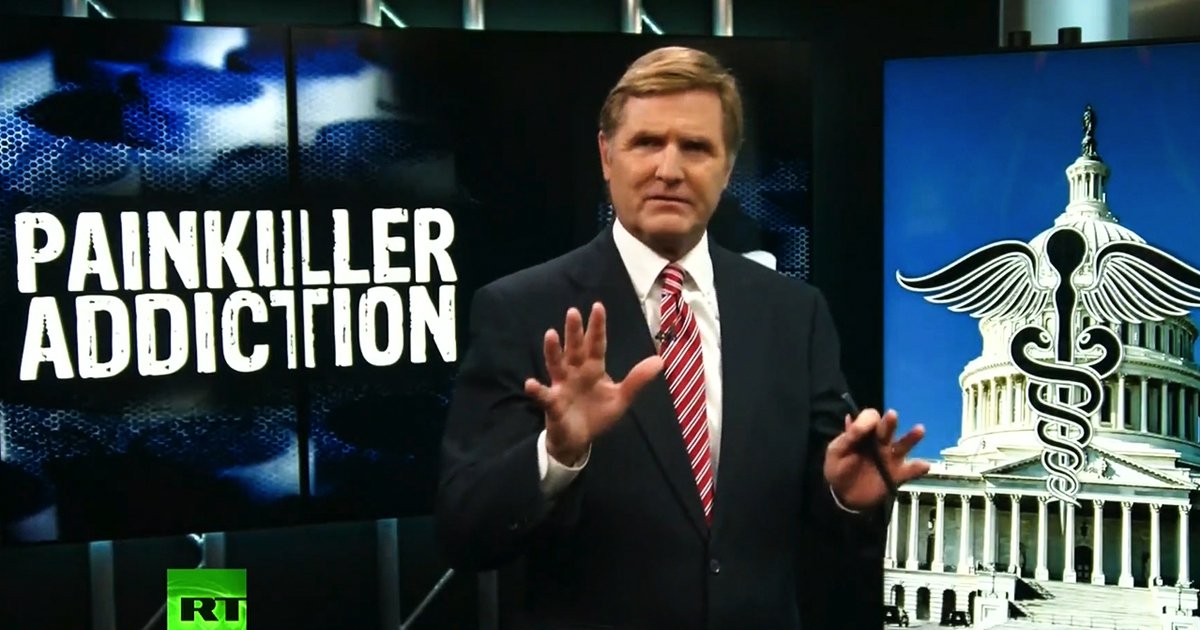To learn more about this topic, visit AL.Law
Via America’s Lawyer: Mike Papantonio discusses the factors that led to the current opioid crisis in the U.S. and speaks with attorney Jeff Gaddy about a lawsuit being brought by the Cherokee Nation against several pharmaceutical companies.
Transcript of the above video:
Papantonio: For the last 18 months, the issue of healthcare and the behavior of the entire healthcare industry has been making headlines. Whether it’s Republicans trying to dismantle the few improvements that have been made to the health insurance system, or greedy Pharma executives price gouging consumers, Americans are being fed a steady stream of news regarding the healthcare industry.
And that’s exactly what Big Pharma wants. The news might not always be flattering, but as long as the public is only focused on price gouging, then they aren’t talking about the opioid crisis that Pharma created; a crisis that is claiming the lives of tens of thousands of American citizens every single year.
In 2015, there were more than 52 thousand deaths in the United States attributed to drug overdoses. About two-thirds of those deaths came from opioids like Oxycontin, Percocet, heroin and Fentanyl. That’s more people than died from auto accidents or firearms in the United States. Big Pharma’s argument is that they can’t control whether or not a person overdoses on their medication.
But when you start to dig into the issue a little deeper, it becomes clear that drug company executives knew this was going to happen, but did nothing because they knew they’d get rich off overdoses. According to a 2015 the study published in the Annual review of Public Health, there is a direct correlation between the increase in opioid prescriptions and the increase in overdose deaths in the United States. And that’s a correlation that Drug company executives have known about for a long time.
To understand Big Pharma’s role in this crisis, we have to go back to the 1990’s when these opioid-based painkillers were released. At the time, the FDA, doctors groups, and even drug company sales reps were concerned about the addictive quality of opioid painkillers. They understood that patients could easily become addicted to painkillers and that these pills were very easy for patients to overdose on.
But rather than demand that drug companies carry out extensive testing, these groups were more than happy to accept the drug companies’ ridiculous lies and assurances that their painkillers were less addictive than other opioids. That’s all it took for doctors. Doctors clearly knew better though.
That one lie from drug companies, a lie that continued for more than a decade, is what led hundreds of thousands of Americans to become addicted to opioid painkillers. Their doctors told them that these pills weren’t addictive because the drug companies swore to them, the doctors, that they weren’t addictive. They made it sound like there was something magic about their opioids.
The drug company Purdue who makes Oxycontin, had to pay out more than $600 million dollars in 2007 after a lawsuit proved that executives, lawyers, and medical officers for the company were lying when they told doctors and the public that their pills were less addictive and more effective than other painkillers on the market. Purdue exaggerated the effectiveness and safety of Oxycontin, while covering up all the criticisms and complaints about the drug. And if you want to know why they did this look no further than this 1996 memo from a Purdue sales manager telling her staff to urge doctors into giving out stronger doses of Oxycontin, ‘sell them more,’ she said. The memo was literally titled “It’s Bonus Time in the Neighborhood!”
Similar allegations have been made against other drug companies that make opioid-based painkillers, and at the root of each of these stories is a company’s never-ending quest for more money, more profits. And right now, American taxpayers are the ones footing the bill for the deadly disaster that Big Pharma created.
For more on the opioid crisis, let’s go to attorney Jeff Gaddy who’s representing groups that have been harmed by opioid painkillers. Jeff, take us back to the beginning here. How did drug companies manage to get away with the big lie that their opioid painkillers weren’t addictive? Because that’s what they were telling doctors and that’s what they were telling patients for 10 years. What’s your take?
Jeff: You’re exactly right, Mike. Thanks for having me on. The short answer to your question is that the companies got away with this by weaving a web of lies. Look, opioids have been used for decades to treat short-term pain management. I’m talking one or two days after a surgery or a trauma incident, but what these drug companies figured out was that if they could find a way to convince the medical community that they could use these opioids for long-term pain management, weeks or even months, that what they could do is they could turn their millions into billions. That’s what they’ve done. At the time, they knew they couldn’t do it with science because the science was against them. What they did, and it’s quite incredible, Mike, but what they did was they went back to their archives and they found a letter to the editor of a medical journal from 1990 where two doctors had written in and provided some anecdotal evidence that they did not see addiction in some hospital patients.
What the drug companies did was they took this letter the editor five sentences long and they cited that letter hundreds and hundreds and hundreds of times. They used that letter and they used other bogus evidence and that they used it to convince the doctors and the health care providers that opioids were not addictive and they used it to perpetuate the myth that opioids could be safely prescribed for long-term use. Look where we are. You just mentioned that in 2015 we had 52,000 deaths. The New York Times just came out this week and said last year it was up to 59,000 deaths. The problem’s just getting worse.
Papantonio: Well look, to be clear, from what we’ve seen from the documents of some of these cases, it’s absolutely clear that drug companies knew how addictive these pain killers were. Yes, you got it right. They were telling the doctors, they were telling patients that ours is different, that our painkiller is much different, but there was really no question while they were saying, that regardless of what this journal said that opioids aren’t addictive, their own studies were showing that they’re absolutely addictive. Did I get that right?
Jeff: There’s no doubt about it, Mike. It’s a story that I know you’ve seen in your line of work time and again, corporate greed. Like I said, these companies knew that they could turn their millions into billions by perpetuating this lie. That’s exactly what they did. Don’t think for a minute that this 1980 article had any scientific value in it what so ever. The authors of that article are shocked and astonished in the way that … Excuse me for calling it an article … that letter to the editor was used to perpetuate this lie. But no, these companies like you brought up, Purdue Pharma, the maker of Oxycontin, they plead guilty to criminal violations. McKesson, one of the biggest pharmaceutical distributors in the country, paid $150 million in civil penalties to the DEA. Cardinal Health paid $44 million. But just like you said, Mike, this is the cost of doing business to these folks. One of these companies had an internal motto of get them high and hope they don’t die. This is their business plan.
Papantonio: Now, there are a lot of different areas of litigation with opioids, Jeff, but one that’s received I guess the most attention is the suit that’s been brought by the Cherokee Nation. Can you tell us about that case? These are the kind of suits that I understand you’re handling. You’re handling cases on behalf of cities and counties. There’s a lawyer in West Virginia that’s way ahead of everybody. His name is Paul Farrell, just a brilliant young trial lawyer that is actually breaking … He is the one coming up with this new methodology to go after these companies. Paul Farrell I think is his name. I think you’ve worked with him. Tell us kind of what’s happening out there generally to push back to these companies. What’s happening?
Jeff: You’re right about the suit that was brought on behalf of the Cherokee Nation that has received a lot of attention for two reasons primarily. First, you’re talking about a population of individuals who just historically have been treated terribly, and as it relates to the opioid epidemic, they’ve been hit just as hard as anyone else. Unfortunately, as they’ve alleged in their complaint, it’s a population that is more prone to addiction. They’ve been absolutely preyed upon by the pharmaceutical industry as it relates to these pills.
The second reason that I believe this suit has gotten a lot of attention is that not only did the Cherokee Nation go after … I’m not talking about Fortune 500 companies, I’m talking Fortune 25 companies. They went after some of the biggest companies in the US. Not only did they go after them, but they filed a lawsuit against them in tribal court. They looked these big companies in the eye and they said, ‘We’re going to hold you accountable and we’re going to do it on our own turf.’
Papantonio: This is what Paul Farrell is doing in West Virginia too. I mean, he’s taking county by county, city by city, where we see that they’ve dumped the opioids in there. The tax payer has to pay for the cleanup. The county loses huge amounts of money. Then there’s this, quickly tell us what the tail is. Once the opioid comes in and everybody’s addicted and then the opioid leaves town, what’s left is what they call the tail of the disaster. Explain that.
Jeff: What we’ve seen, Mike, and what the tail is is heroin. We’ve seen state by state by state get proud of themselves and pat themselves on the back for shutting down pill mills. What they’re now finding out state by state is that when the pills dry up, the heroin moves in. It happened in Kentucky. It’s happened in Ohio. It’s happening all over the country. It’s just a matter of time before it’s happening everywhere.
Papantonio: Jeff, I think what’s going to be important is that the suits that you’re, the kind of lawsuits you’re bringing on behalf of counties and cities and states along with Paul Farrell, I think your methodology is brilliant. I really do believe that in the end, that’s what’s going to be the biggest push back here. Full disclosure, I’m involved with that also, but for the life of me I haven’t figured out any way to go after these companies other than simply taking their money away from them, their huge profits, because they’ve made billions of dollars at the expense of people’s lives. Thanks for joining me.



